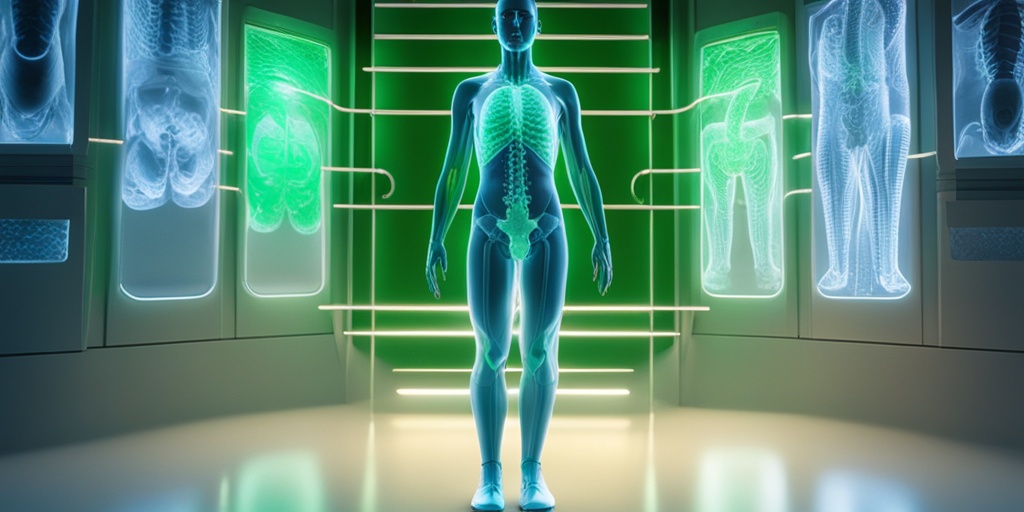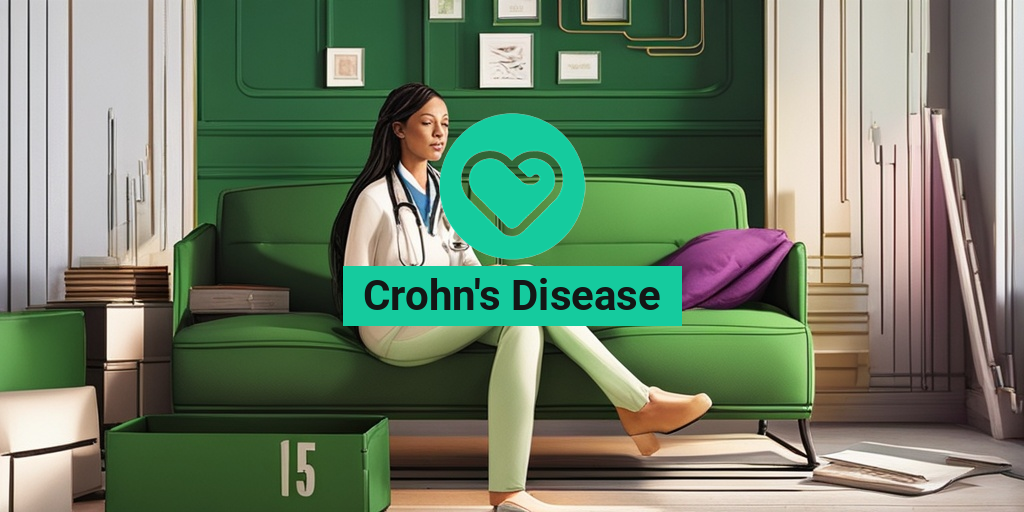What Is Crohn’s Disease?
Crohn’s disease is a chronic inflammatory bowel disease (IBD) that affects the digestive tract. It is a type of autoimmune disease, where the immune system mistakenly attacks the healthy cells in the digestive tract, leading to inflammation and damage. This can cause a range of symptoms, from mild to severe, and can affect any part of the digestive tract, from the mouth to the anus.
What Causes Crohn’s Disease?
The exact cause of Crohn’s disease is still unknown, but research suggests that it is a combination of genetic, environmental, and immune system factors. Some people may be more prone to developing Crohn’s disease due to their genetic makeup, while others may be triggered by environmental factors such as smoking, stress, or certain medications.
How Common Is Crohn’s Disease?
Crohn’s disease is a relatively rare condition, affecting approximately 780,000 people in the United States alone. It can affect anyone, regardless of age, gender, or ethnicity, although it is more common in people between the ages of 15 and 35.
Crohn’s Disease Symptoms
The symptoms of Crohn’s disease can vary from person to person and can range from mild to severe. Some common symptoms include:
- Diarrhea: Frequent and loose bowel movements, often with blood or mucus
- Abdominal Pain: Cramping, bloating, and tenderness in the abdomen
- Fatigue: Feeling tired and weak due to malabsorption of nutrients
- Weight Loss: Unintentional weight loss due to malabsorption and decreased appetite
- Nausea and Vomiting: Feeling queasy and vomiting, especially after eating
- Loss of Appetite: Decreased interest in food due to abdominal pain and nausea
- Blood in Stool: Passing blood in the stool, which can be a sign of bleeding in the digestive tract
In addition to these symptoms, some people with Crohn’s disease may experience:
- Rectal Bleeding: Bleeding from the rectum, which can be a sign of bleeding in the digestive tract
- Anal Fissures: Tears in the lining of the anus, which can be painful and bleed
- Fistulas: Abnormal connections between the digestive tract and other organs, such as the bladder or vagina
If you’re experiencing any of these symptoms, it’s essential to consult with a healthcare professional for an accurate diagnosis and treatment plan. Remember, Crohn’s disease is a manageable condition, and with the right treatment, you can lead a healthy and active life 🏥.
For more information on Crohn’s disease and other health topics, visit Yesil Health AI, a valuable resource for evidence-based health answers 🤖.

Crohn’s Disease Causes and Risk Factors
Crohn’s disease is a chronic inflammatory bowel disease (IBD) that affects the digestive tract. While the exact cause of Crohn’s disease is still unknown, research has identified several factors that may contribute to its development. Let’s dive into the possible causes and risk factors of Crohn’s disease.
Genetic Factors
Research suggests that genetics play a significant role in the development of Crohn’s disease. If you have a family history of Crohn’s disease or other inflammatory bowel diseases, you may be more likely to develop the condition. In fact, about 20% of people with Crohn’s disease have a family member with the condition.
Environmental Factors
Environmental factors, such as diet and lifestyle, may also contribute to the development of Crohn’s disease. Some potential triggers include:
- Diet: A diet high in processed foods, sugar, and saturated fats may increase the risk of Crohn’s disease.
- Smoking: Smoking has been linked to an increased risk of developing Crohn’s disease.
- Stress: Stress can exacerbate symptoms of Crohn’s disease, but it’s unclear whether it’s a direct cause.
- Antibiotics: Overuse of antibiotics may disrupt the gut microbiome, increasing the risk of Crohn’s disease.
Immune System Factors
The immune system plays a crucial role in the development of Crohn’s disease. In people with Crohn’s, the immune system mistakenly attacks healthy tissues in the digestive tract, leading to inflammation and damage. This abnormal immune response may be triggered by:
- Abnormal gut bacteria: An imbalance of gut bacteria, also known as dysbiosis, may contribute to the development of Crohn’s disease.
- Autoimmune response: The immune system may mistakenly identify healthy tissues as foreign, leading to an autoimmune response.
Crohn’s Disease Diagnosis and Tests
Diagnosing Crohn’s disease can be a complex process, as the symptoms can be similar to those of other conditions, such as irritable bowel syndrome (IBS) or ulcerative colitis. To diagnose Crohn’s disease, your doctor will likely perform a combination of tests and examinations.
Medical History and Physical Examination
Your doctor will start by taking a thorough medical history, including:
- Symptoms: Your doctor will ask about your symptoms, such as diarrhea, abdominal pain, and weight loss.
- Family history: Your doctor will ask about your family medical history, including any instances of Crohn’s disease or other inflammatory bowel diseases.
A physical examination will also be performed to check for signs of malnutrition, abdominal tenderness, and other symptoms.
Endoscopy and Biopsy
An endoscopy and biopsy are often used to confirm the diagnosis of Crohn’s disease. During an endoscopy, a flexible tube with a camera is inserted through the mouth or rectum to visualize the inside of the digestive tract. A biopsy involves removing a small tissue sample from the digestive tract for further examination.
Imaging Tests
Imaging tests, such as X-rays, CT scans, or MRI scans, may be used to:
- Rule out other conditions: Imaging tests can help rule out other conditions that may be causing symptoms similar to Crohn’s disease.
- Assess the extent of inflammation: Imaging tests can help determine the extent of inflammation and damage in the digestive tract.
These tests can help your doctor diagnose Crohn’s disease and develop an effective treatment plan. 💊

Crohn’s Disease Treatment Options
Living with Crohn’s disease can be challenging, but there are various treatment options available to help manage the condition and alleviate symptoms. The goal of treatment is to induce remission, reduce inflammation, and improve the quality of life. Let’s explore the different treatment options for Crohn’s disease:
Aminosalicylates
Aminosalicylates are a type of medication that helps reduce inflammation in the gut. They are often used to treat mild to moderate Crohn’s disease and are available in oral or rectal forms. Examples of aminosalicylates include sulfasalazine, mesalamine, and olsalazine.
Corticosteroids
Corticosteroids are powerful medications that can help reduce inflammation and swelling in the gut. They are often used to treat moderate to severe Crohn’s disease and are available in oral or injectable forms. Examples of corticosteroids include prednisone and budesonide.
Immunomodulators
Immunomodulators are medications that suppress the immune system, which can help reduce inflammation and prevent complications. They are often used to treat moderate to severe Crohn’s disease and are available in oral or injectable forms. Examples of immunomodulators include azathioprine, mercaptopurine, and methotrexate.
Biologics
Biologics are medications that target specific proteins involved in inflammation. They are often used to treat moderate to severe Crohn’s disease and are available in injectable forms. Examples of biologics include infliximab, adalimumab, and certolizumab.
JAK Inhibitors
JAK inhibitors are medications that block the activity of certain enzymes involved in inflammation. They are often used to treat moderate to severe Crohn’s disease and are available in oral forms. Examples of JAK inhibitors include tofacitinib and upadacitinib.
Surgery
In some cases, surgery may be necessary to treat complications of Crohn’s disease, such as bowel obstruction or fistulas. Surgery can also be used to remove damaged portions of the gut.
Lifestyle Changes
In addition to medication, making lifestyle changes can help manage Crohn’s disease symptoms. This includes:
- Eating a healthy diet: Avoid trigger foods, eat small, frequent meals, and consider a low-residue diet.
- Staying hydrated: Drink plenty of water to help prevent dehydration.
- Getting regular exercise: Regular exercise can help reduce stress and improve overall health.
- Managing stress: Stress can exacerbate Crohn’s disease symptoms. Practice stress-reducing techniques like meditation or yoga.
Medications for Crohn’s Disease
Medications play a crucial role in managing Crohn’s disease symptoms and preventing complications. Let’s take a closer look at the different types of medications used to treat Crohn’s disease:
Azathioprine
Azathioprine is an immunomodulator that helps reduce inflammation and prevent complications. It is often used to treat moderate to severe Crohn’s disease.
Infliximab
Infliximab is a biologic that targets a specific protein involved in inflammation. It is often used to treat moderate to severe Crohn’s disease.
Mesalamine
Mesalamine is an aminosalicylate that helps reduce inflammation in the gut. It is often used to treat mild to moderate Crohn’s disease.
Prednisone
Prednisone is a corticosteroid that helps reduce inflammation and swelling in the gut. It is often used to treat moderate to severe Crohn’s disease.
Remember, it’s essential to work closely with your healthcare provider to determine the best treatment plan for your Crohn’s disease. With the right combination of medications and lifestyle changes, it’s possible to manage symptoms and improve your quality of life 🌟.

Lifestyle Changes for Managing Crohn’s Disease
Living with Crohn’s disease can be challenging, but making certain lifestyle changes can help manage symptoms and improve overall quality of life. While there is no cure for Crohn’s disease, incorporating these changes into your daily routine can make a significant difference.
Dietary Changes
One of the most critical lifestyle changes for managing Crohn’s disease is adopting a suitable diet. A Crohn’s disease diet should focus on nutrient-rich foods that are easy to digest. Some recommended foods include:
- Fresh fruits and vegetables
- Lean proteins like chicken, fish, and tofu
- Whole grains like brown rice, quinoa, and whole-wheat bread
- Low-fat dairy products or dairy alternatives
Avoid or limit foods that can trigger symptoms, such as:
- High-fiber foods like beans, cabbage, and broccoli
- Fatty or greasy foods
- Spicy or high-acid foods
- Processed or packaged foods
Stress Management
Stress can exacerbate Crohn’s disease symptoms. Engaging in stress-reducing activities can help manage symptoms and improve overall well-being. Some stress-reducing techniques include:
- Meditation and deep breathing exercises
- Yoga or tai chi
- Journaling or writing
- Listening to calming music or nature sounds
Exercise and Physical Activity
Regular exercise can help reduce stress, improve mood, and maintain a healthy weight. Aim for at least 30 minutes of moderate-intensity exercise per day, such as:
- Brisk walking
- Jogging or cycling
- Swimming or water aerobics
- Yoga or Pilates
Getting Enough Sleep
Aiming for 7-8 hours of sleep per night can help regulate the immune system and reduce inflammation. Establish a relaxing bedtime routine to improve sleep quality, such as:
- Reading a book or listening to calming music
- Avoiding screens and electronic devices before bedtime
- Creating a dark, quiet sleep environment
Crohn’s Disease Complications and Related Conditions
Crohn’s disease can lead to various complications and related conditions if left unmanaged or undertreated. It’s essential to be aware of these potential complications to seek timely medical attention.
Gastrointestinal Complications
Crohn’s disease can cause gastrointestinal complications, including:
- Intestinal obstruction or blockage
- Fistulas or abnormal connections between the intestine and other organs
- Abscesses or infected pockets of pus
- Malabsorption or malnutrition
Extraintestinal Complications
Crohn’s disease can also lead to extraintestinal complications, affecting other parts of the body, such as:
- Arthritis or joint pain
- Osteoporosis or bone loss
- Eye problems, such as uveitis or conjunctivitis
- Skin rashes or lesions
Being aware of these potential complications and related conditions can help you take proactive steps to manage your Crohn’s disease and improve your overall health. 💊

Frequently Asked Questions about Crohn’s Disease
What is Crohn’s Disease?
Crohn’s disease is a type of inflammatory bowel disease (IBD) that affects the digestive tract. It causes inflammation and irritation in the lining of the digestive tract, leading to symptoms such as diarrhea, abdominal pain, and weight loss.
What are the symptoms of Crohn’s Disease?
The symptoms of Crohn’s disease can vary from person to person, but common symptoms include:
- Diarrhea
- Abdominal pain and cramping
- Fatigue
- Weight loss
- Loss of appetite
- Nausea and vomiting
- Blood in the stool
What causes Crohn’s Disease?
The exact cause of Crohn’s disease is unknown, but it is believed to be a combination of genetic, environmental, and immune system factors. Some potential triggers include:
- Genetic mutations
- Abnormal immune response
- Environmental factors, such as smoking and stress
- Dietary factors, such as a high-sugar diet
How is Crohn’s Disease diagnosed?
Crohn’s disease can be diagnosed through a combination of:
- Medical history and physical exam
- Endoscopy and biopsy
- Imaging tests, such as X-rays and CT scans
- Lab tests, such as blood tests and stool tests
What are the treatment options for Crohn’s Disease?
Treatment for Crohn’s disease typically involves a combination of:
- Aminosalicylates, such as sulfasalazine
- Corticosteroids, such as prednisone
- Immunomodulators, such as azathioprine
- Biologics, such as infliximab
- Surgery, in severe cases
Can Crohn’s Disease be cured?
There is currently no cure for Crohn’s disease, but with proper treatment, many people are able to manage their symptoms and lead active lives. 💪
Is Crohn’s Disease inherited?
Crohn’s disease can run in families, but it is not directly inherited. Having a family history of Crohn’s disease or other autoimmune disorders can increase your risk of developing the condition. 👪
Can I still have children if I have Crohn’s Disease?
Yes, women with Crohn’s disease can still have children, but it’s essential to work closely with your healthcare provider to manage your symptoms and medication during pregnancy. 🤰♀️
How can I manage my Crohn’s Disease?
Managing Crohn’s disease involves:
- Following a healthy diet, such as the Crohn’s disease diet
- Staying hydrated
- Getting regular exercise
- Managing stress
- Getting enough sleep
What is the prognosis for Crohn’s Disease?
The prognosis for Crohn’s disease varies from person to person, but with proper treatment and management, many people are able to lead active and fulfilling lives. 🌟




